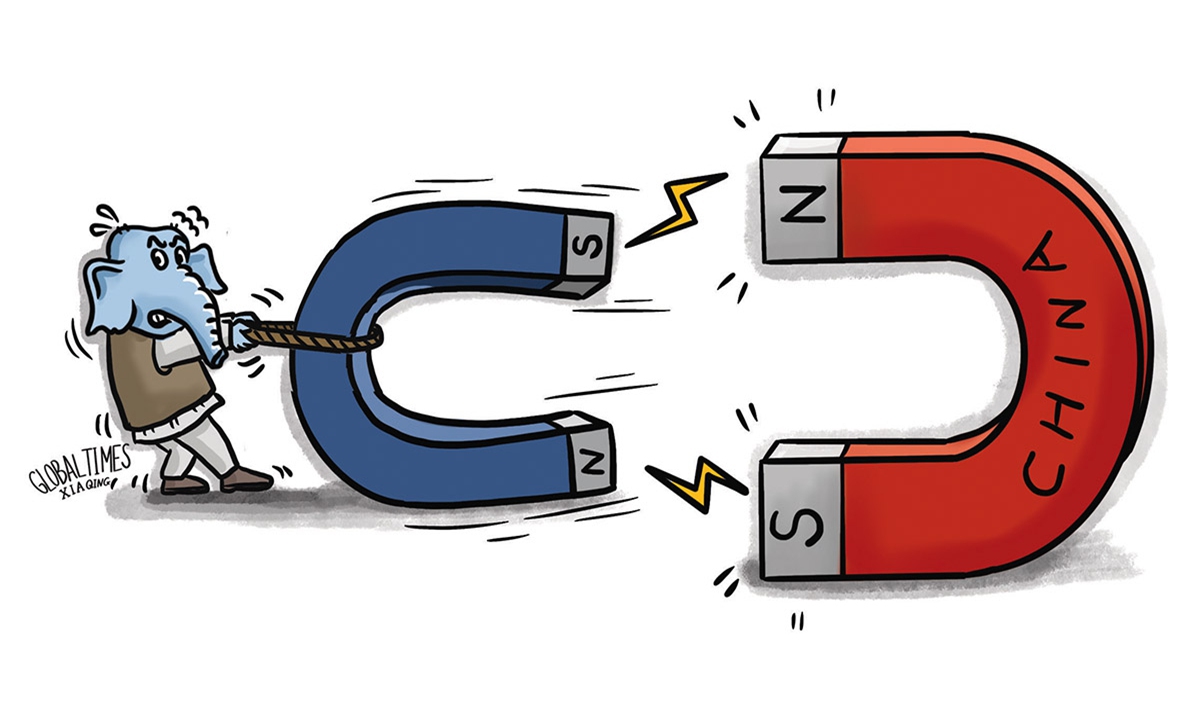
India Illustration: Xia Qing/Global Times
The Indian government may require more Chinese companies to reduce their stakes in joint ventures (JVs) in the country, according to Indian media reports. Experts said that such a hostile move won't do much to improve the gloomy business climate for foreign investors, especially those from China.
According to Indian media outlet the Economic Times on Friday, the Indian government could soon effect a new tweak in its JV playbook for Chinese companies doing business in the country. The report, citing a Times of India report on the same day, said that after giving the nod to India-China JVs such as JSW-MG Motor India, the government is now looking to require Chinese companies to dilute their stakes in Indian ventures.
Decisions will be made on a "case-by-case" basis with a focus on security concerns, said the Times of India report.
A senior industry insider based in India told the Global Times on Monday on condition of anonymity that for Chinese firms already established in India, grappling with operational constraints and pressures, this move may indicate that "they will be compelled to heed Indian demands by selling their equity at reduced prices, with Indian companies stepping in."
"However, for those yet to enter the Indian market, the unfriendly business environment and elevated country risk levels warrant cautious consideration," the insider noted.
Following the border conflict between China and India in June 2020, there has been a marked increase in the Indian government's adversarial stance toward Chinese companies. This has included actions such as banning more than 200 Chinese apps, launching probes into tax and anti-money laundering issues concerning Chinese businesses, and stepping up scrutiny of Chinese investments in the country.
Previously, Chinese companies in India could invest through the automatic route, but now all investments from across the border must receive Indian government approval, the Economic Times reported.
In the four years since the rule changed in 2020, the Indian government has received about 450 applications from Chinese companies, but only about 70 have been approved, according to the report.
The Indian government has been consistently suppressing Chinese companies, severely affecting the business environment, and many Chinese firms have opted to reduce investments in India, while some have moved to neighboring countries, Qian Feng, director of the research department at the National Strategy Institute at Tsinghua University, told the Global Times on Monday.
Despite facing pressure from Indian authorities, overall bilateral trade and economic cooperation continued to rise.
In the first quarter, India's exports to China surged by 22.5 percent year-on-year, data from China's General Administration of Customs showed.
"This underscores the growing economic complementarity and integration between China and India, which remain unaffected by intensified political pressures," Qian said.
India's manufacturing sector is heavily reliant on Chinese raw materials, technology and intermediate goods. Moreover, Chinese companies possess advanced technology that can aid India's manufacturing sector, Qian noted.
When it comes to the actual effect of the latest reported move by the Indian authorities, Qian said that more observation is still needed.




